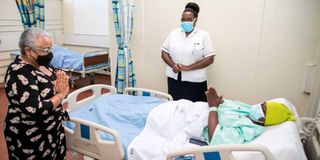NHIF to cover obstetric fistula in its packages

First Lady Margaret Kenyatta visits patients during a tour of the Specialised Reproductive Health Clinic 66 at Kenyatta National Hospital, Nairobi, during the commemoration of the International Day to End Obstetric Fistula.
What you need to know:
- First Lady Margaret Kenyatta has applauded NHIF for the move by NHIF to include obstetric fistula in its health packages.
- She also visited patients who had benefited from free fistula surgeries at KNH as part of activities to commemorate International Day to End Obstetric Fistula.
There is hope for obstetric fistula patients after National Hospital Insurance Fund (NHIF) included the medical condition in its health packages.
While speaking at Kenyatta National Hospital (KNH) during activities to commemorate the International Day to End Obstetric Fistula (IDEOF) on Tuesday, First Lady Margaret Kenyatta has applauded NHIF for the move.
She called for sustained efforts to end fistula, pledging her continued support to the global campaign to end fistula.
“I will continue to lend my voice and support for increased investment to restore the dignity of women and girls. Collectively, we can create awareness, lobby for and put in place supportive measures to strengthen the capacity of our health systems to offer more treatment and surgical repairs as well as training of more doctors,” said Ms Kenyatta.
The First Lady also visited patients who had benefited from free fistula surgeries at KNH as part of activities to commemorate the IDEOF. The women were drawn from Kitui, Baringo, Laikipia, Nakuru, Marsabit, Homa Bay and Nairobi counties.
The surgeries were performed during the ongoing fistula camp organised by KNH that started on May 17 and ends tomorrow.
Speaking at the same event, Health PS Susan Mochache re-affirmed the ICPD25 commitment of the Kenyan government to accelerate the end of obstetric fistula.
UNFPA Country Director Dr Ademola Oladije said that to eliminate obstetric fistula, communities must be empowered to undertake actions that address gender vulnerabilities and promote health while increasing their access to comprehensive and quality Sexual and Reproductive Health and Rights (SRHR) services.
Corrective surgery
“There is probably no greater joy than that of a woman whose dignity has been restored through fistula surgery,” said Dr Oladije.
Chairperson Safaricom Foundation Joseph Ogutu, observed that men should be in the conversation around ending fistula by offering support to women undergoing the same.
Every year, there is a backlog of about 1,000 cases of women living with fistula awaiting surgery in Kenya, with a majority unable to afford it.
According to UNFPA, fistula corrective repair surgery, when heavily subsidised, costs about Sh30,000.
In private hospitals the cost is at least five times more, and only 7.5 per cent of women in Kenya are able to access treatment.
Women and girls with fistula face a lot of stigma and are often abused, beaten, abandoned, and isolated. Without repair, fistula may cause a fetid odour, frequent pelvic and urinary infections, painful genital ulcerations, infertility and nerve damage to the legs.
While theatre equipment and supplies are not a major hindrance to fistula repair, routine repair remains rare and is mainly done only at KNH and the Moi Referral and Teaching Hospital in Eldoret.
Over the years, UNFPA, Beyond Zero Campaign, Safaricom Foundation, AMREF Health Africa, Flying Doctors Society of Africa and other partners have come together to hold fistula repair camps for women in need.





